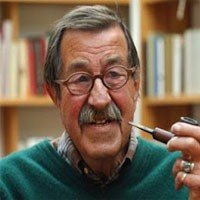Articles features
Nobel laureate writer Gunter Grass dead

Berlin, April 13
Renowned German novelist,
poet, playwright, illustrator, graphic artist, sculptor and recipient of
the 1999 Nobel Prize in Literature Gunter Grass passed away on Monday
in the city of Lubeck.
Grass, 87, died of a lung infection, Germany's international broadcaster Deutsche Welle reported.
"A
childhood between the Holy Spirit and Hitler," is how biographer
Michael Jurgs summed up the environment in which Grass spent his
childhood.
At the age of just 17, he witnessed the horrors of
World War II as a member of the Hitler Youth. He later joined the
Waffen-SS, a Nazi special forces unit.
His literary career began
in 1952. He wrote dramas, poems, and especially fiction. The list of
his works is very long, and includes "Cat and Mouse" and "Dog Years",
which, together with "The Tin Drum", were part of his famous "Gdansk
Trilogy"; "Local Anesthetic", "The Flounder", "The Rat", "The Call of
the Toad" and "Crabwalk".
The "Tin Drum" was adapted into an Oscar-winning film by Volker Schlondorf in 1979.
Most
of his works dealt with political conditions and social upheaval, like
the sinking of a refugee ship in the Baltic Sea in 1945, the role of
intellectuals in the uprising in former East Germany in 1953, the
student protests of 1968, federal election campaigns and political
relations between the East and West.
Gunter Grass was a
multi-talented artist, not only a novelist and poet, but also a sculptor
and designer who occasionally also designed the covers of his books.
Gunter Grass and Kolkata - a four decade of love-hate tale
Kolkata, April 13 (IANS) From a dark depiction of the "omnipresent stench", the people dwelling in concrete pipes and damning criticism of the city's culture of hero worship to a philanthropic reachout to its marginalized people like ragpickers - Gunter Grass' 40-year-old association with Kolkata had multiple shades.
The versatile German Nobel Laureate, who effortlessly moved from one genre of art to another, visited the city thrice - the trips separated at least by a decade - talking to its street children, sex workers, women tobacco factory workers, artists and intellectuals and picking up ideas for his poems, novels and paintings.
The maiden tour came in 1975, and the fallout was a chapter in the novel The Flounder two years later.
Grass returned to the eastern metropolis towards the end of 1986 with his wife Ute, mainly for the Bengali-language staging of his 1966 play, ''The Plebeians Rehearse the Uprising".
Half of his six-month stay was at the posh Salt Lake residence of painter Shuvaprasanna, who refers to the German genius as not only his "best friend" but also as "my friend, philosopher and guide".
Two years later - in 1988 - Grass came out with "Show Your tongue" - 97 pages of journals, a 12-stanza poem and 112 pages of Expressionist drawings.
The title was a reference to goddess Kali, who is usually depicted with her tongue hanging out, and is the presiding deity of the famous temple in south Kolkata's Kalighat.
The diary-like book talked of "cowdung patties" (dried cow dung) dried on graffiti filled walls, blocks of stuffy buildings, which often were without water and electricity, child rag pickers, shelterless people sleeping out the nights under the open skies - and an omnipresent stench.
Needless to say, it created a storm, with intellectuals and politicians attacking him for showing Kolkata in poor light.
But Shuvaprasanna has no doubts that Grass loved Kolkata. "But it is the love of a creative mind. He spoke to the hoi polloi and the gentry and carefully analysed in his mind what he saw. The book was a product of all that," the painter told IANS.
"He always hated hypocrisy. He hated the hypocrisy he saw here. He did not like the culture of hero worship. He said you don't dissect he qualities of your heroes".
The book was dedicated to the Calcutta Social Project (CSP), a non-governmental organisation working for the underprivileged and financially excluded women and children.
CSP's accountant-administrator Netai Bera still remembers those days. "For the first few months he stayed at Baruipur (southern suburb of Kolkata). He went to the Dhapa garbage dumping ground regularly to study the project for child ragpickers we were running there.
"He used to come to our office very often. He went to the slums in the city where we had projects, mingling freely with pavement dwellers, street children. He did not have any airs," Beral told IANS.
"He not only dedicated the book to CSP, he also used to send good amount of money from its royalty every year. At times, the figure went up to Rs 3-4 lakhs."
Shuvaprasanna recalled that when he held an exhibition in Munich in 1988, Grass inaugurated it. "He also invited me to his house."
Grass' last visit to Kolkata was in February, 2005. "I took him to the book fair then. He liked the atmosphere, the love of books".
In 2013, when filmmaker Gautam Ghosh made a documentary on Shuvaprasanna, a portion of that was shot in Germany dwelling on the painter's relations with Grass. "He enthusiastically took part in the film."
Shuvaprasanna and Grass also jointly composed a painting in 2013. "He called it Shuva and me. And that is how the painting and documentary are known."



































